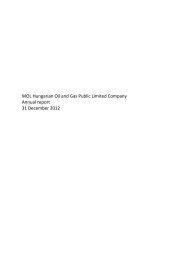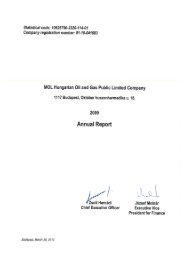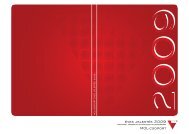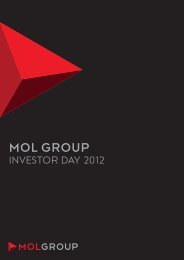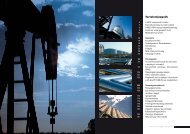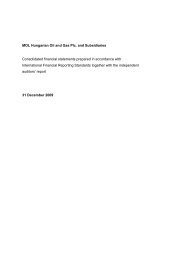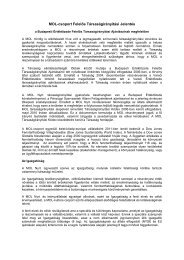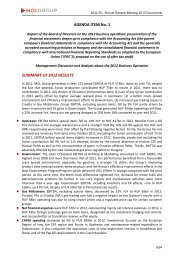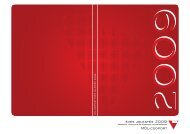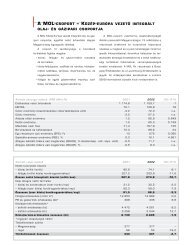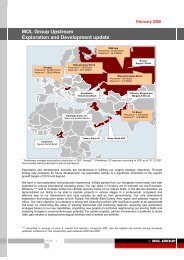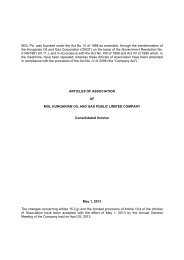MOL GROUP Annual Report
MOL GROUP Annual Report
MOL GROUP Annual Report
- No tags were found...
You also want an ePaper? Increase the reach of your titles
YUMPU automatically turns print PDFs into web optimized ePapers that Google loves.
The main programme elements are Extra Screening, STEP Active, Effective Health Communication and the Stop SmokingCampaign. The recent inclusion of IES and <strong>MOL</strong> Romania brought the total of participating <strong>MOL</strong> Group member companiesto 14 in seven countries. STEP now covers 45 percent of the total workforce (excluding INA).New programs were started in several locations in 2010, including:– An office package including office gymnastics and mobile massage. Office employees participated 688 times ingymnastics and took advantage of the mobile massage 1,856 times;– A total of 28 teams and more than 185 employees participated in the ’together-easier’ competition at <strong>MOL</strong>Hungary. The drive was aimed to motivate colleagues to lose weight and improve their fitness level;– Many improvements were also realised in the organisation of STEP screenings and STEP communication.Almost 6600 employees took part in different STEP programmes – 3,653 in different sport activities in 2010, including 2,254new participants. The cumulative participation rate of 81% exceeded our 75% target for 2010.The health-related absence rate was only 1.80% (related to total scheduled working hours at <strong>MOL</strong>, Slovnaft, TVK and SPC);an outstanding result even at the EU level.3.4 Investment in Human CapitalAttracting EmployeesCompetitive compensation and career opportunities provided by the expansion of <strong>MOL</strong> Group coupled with a prosperousrelationship with secondary and higher education institutes and active career management has enabled us to retain keyemployees and constantly attract new talent.Competitive compensationOur job grading system is based on the HAY Methodology. By extending the system to our subsidiary companies in 2010,about 75 percent of <strong>MOL</strong> Group employee positions (excluding INA) were graded. HAY enabled the company to managea single, logical, transparent and consistent system that ensures the adequate treatment of our employees based on thenature of their work and their position within the company. Moreover, the results of the grading process provided the basisfor a fair compensation system.Compensation packages – based on HAY grades and performance appraisals – are aimed at the top 25% of the local marketlevel but also take into consideration the financial resources and special needs/situation of local companies.3.3 Process Safety and Risk ManagementCOMPASS – the HSE risk assessment frameworkFor the successful implementation of our HSE risk assessment framework, we have perpetuated our COMPASS Project(comprehensive risk assessment). The programme applies ten internationally accepted risk assessment methodologies thatcover the workplace, technological processes and environmentally-related areas of risk analysis (HAZID, ENVID, JSA, EIA,etc.).Main achievements in 2010 include:– implementation of COMPASS, focused on the sites of <strong>MOL</strong>, Slovnaft and SPC in which qualitative analyses coveredexploration and production, refining, logistics and retail activities following HSE risk assessment standards;– HAZOP assessments were executed with regards to quantitative process- related risks, resulting in the coverageof approximately 80% of critical operations;– an IT tool named ’COMPASS ITSS’ was developed, providing a ’smart tool’ for line management’s risk-baseddecisions. COMPASS ITSS will be expanded in the future to support other risk-related Group processes, e.g.Enterprise Risk Management.In 2011, COMPASS is aimed to be extended to INA, IES, Tifon, <strong>MOL</strong> Austria, <strong>MOL</strong> Romania and <strong>MOL</strong> Pakistan, while itsimplementation at the Group level is aimed to be completed by the end of 2012.Process Safety Management<strong>MOL</strong> Group has continued operating and further improving the Process Safety Management (PSM) System, firstimplemented in 2006. The main reason for PSM is to minimise the number of process-related incidents (including low hazardoperations without strict legal standards) which could result in fire, explosion, property damage, and harm to people or theenvironment. Measuring the efficiency and evaluation of the implementation were the main focuses in 2010. Specific PSMkey performance indicators (KPI) were defined and applied to measure the progress, perform internal benchmarking, andto establish necessary actions for the future. We also started an auditing process to observe the implementation process indetail at individual operations and for individual PSM elements.Emergency preparedness and responseEven though the mainstay of our fire safety strategy is prevention, and modern and effective fire-detection and built-infire-fighting systems, renewal of fire water networks as well as the most modern firefighting agents and equipment hascontributed even further to the improvement of <strong>MOL</strong> Group’s firefighting efficiency.In 2010, a total of 23 fires were reported within the <strong>MOL</strong> Group, excluding INA. The majority of the blazes were caused by some smallleakages where the escaping hot hydrocarbons were self-ignited. Thankfully, none of the conflagrations resulted in injuries, assetloss or any other real damages. However, some serious fires also occurred, mainly at Exploration and Production or its contractors.The most serious fire/explosion happened at the Csepel base depot where a contractor lost his life while cleaning a tank.Two of the main elements of successful emergency preparedness are exercises and drills. The entire workforce underwentmany exercises together with the local fire brigades (e.g. the Exploration and Production Division held 15 exercises at theGroup level). Emergency drills and exercises are conducted regularly on all sites, especially in refineries and on petrochemicalsites. Twenty-eight emergency drills were executed in 2010 within Petchem alone.Range of ratios of corporate minimum wage compared to local minimum wage at significant (more than 100 employees)operating locations (%)Country (Company) 2009 2010Austria (Roth Heizöle GmbH) n.a. 111%Bosnia Herzegovina (Energopetrol d.d.) n.a. 148%Croatia (INA d.d.) 133% 133%Hungary (<strong>MOL</strong> Plc.) 171% 173%Italy (IES S.p.A.) n.a. 168%Romania (<strong>MOL</strong> Romania PP s.r.l.) n.a. 152%Pakistan (<strong>MOL</strong> Pakistan Ltd.) 250% 349%Russia (BaiTex LLC) n.a. 142%Serbia (Intermol d.o.o.) 113% 112%Slovakia (Slovnaft a.s.) 152% 170%Slovenia (<strong>MOL</strong> Slovenija d.o.o.) n.a 100%The compensation system is dependent upon performance. Taking their annual performance into consideration, employeesreceive an annual bonus. The managerial compensation system consists of short- and long-term incentive elements such asbonuses, a complex long-term incentive linked to the <strong>MOL</strong> stock price, and the company’s performance/results.Our fringe benefit system, amounting to 20-40 percent of the annual compensation package, is subject to national tax,health and pension requirements. The system ensures the flexible choice of social (e.g. health care services/payments, childand/orpension care, insurance, etc.) and other non-social (e.g. Internet, etc.) fringe benefits according to individual needs.Investing in educationAccording to the results of the survey carried out by AON-Hewitt and Figyelő among fresh graduates, <strong>MOL</strong> was the secondmost desired company in 2010, and the top one in the financial sector. This is the highest recognition of our long-term effortsto attract and retain talent.Partnership with secondary schools<strong>MOL</strong> has been maintaining close and regular cooperation with secondary schools. A lack of natural science experts has beenobserved in the market. Therefore, special attention has been given to promote natural science studies among secondaryschools.In 2010, we supported more than 70 vocational schools and offered internships for 293 students at <strong>MOL</strong> Group – primarilyfor those attending chemical, gas and mechanical studies. Furthermore, <strong>MOL</strong> sponsored numerous competitions inmathematics, physics and chemistry.Sustainability188 <strong>MOL</strong> Group annual report 2010 189



